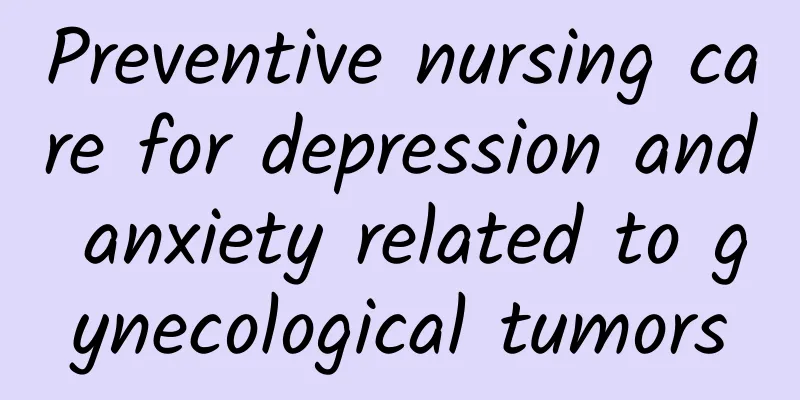Preventive nursing care for depression and anxiety related to gynecological tumors

|
When we are diagnosed with gynecological cancer, we often face a multifaceted sense of crisis: we feel confused, worried, scared, unwilling, angry, and struggle with what life really means, what we want to cherish and value, and how to live a life that is important to us and our loved ones. If we immerse ourselves in such thoughts for a long time, we may suffer from anxiety, depression, sleep disorders, etc., which will be another blow to our lives and diseases. The 2018 National Comprehensive Cancer Network (NCCN) Cancer Distress Management Guidelines point out that anxiety and depression are the most common mental disorders in cancer patients, and also classify them as psychological distress, which can seriously affect the ability of cancer patients to cope with the disease and aggravate the progression of cancer. According to relevant statistics, depression can reduce the survival rate of patients by 10%-20%. Therefore, we all need to understand and be familiar with certain knowledge about anxiety and depression, and actively prevent and detect them early, and carry out targeted psychological counseling or treatment as early as possible to avoid or reduce further damage to physical and mental health and improve our quality of life and survival time. Main symptoms of depression The main manifestations of depression are: low mood, loss of interest, silence, memory loss, inattention, pessimism, difficulty sleeping, hallucinations, delusions, anxiety and other symptoms. People feel that life is meaningless and may even have suicidal thoughts or behaviors. The main manifestations of anxiety are: feeling upset, nervous, having wild thoughts, and always worrying about losing control or having accidents. We can sense our own state through ourselves and our relatives and friends: low mood exists almost all day long, at least for 2 weeks or more, and generally does not change with the environment. If you find the above symptoms, you need to seek medical attention in time. Specific psychological interventions In recent years, researchers at home and abroad have proposed a variety of psychological therapies, including: Cognitive Behavioral Education: ① Health education: understanding tumors, cancer surgery and chemotherapy, nursing and humanistic care; ② Family interaction and support from relatives. Relaxation training: ①Breathe and relax; ②Progressive muscle relaxation. Music Therapy Biofeedback Device Specific psychological intervention measures are as follows: Listening and Speaking Medical staff, relatives, friends, fellow patients, etc. can all be our confidants. We can work together, encourage and support each other. We can make progress together and fight cancer. We can understand each person's different and wonderful life, and find hobbies and seek fun together. In such a caring and uplifting atmosphere, relaxation and a positive attitude are promoted. Health Education Promoting health education through gynecological tumor-related brochures, multimedia technology and other methods, seeking detailed explanations of disease diagnosis and prognosis from nurses and doctors, knowing more about oneself, and actively making positive cognitive behavioral changes can help reduce helplessness, anxiety, depression levels and life stress. Relaxation training Under the guidance of a physician, training in "guided imagery" or progressive muscle relaxation is provided through tape recordings, using distractions such as breathing, progressive muscle relaxation, and meditation, imagining the stages before and after surgery to control anxiety, or alternatively imagining being in a safe and comfortable place to reduce stress. Music Therapy Choose the music that suits us best and makes us feel most relaxed. Once we have chosen the right music, there are many different ways to listen to it. Deep breathing relaxation, progressive muscle relaxation: tense, hold and relax specific muscle groups while listening to music, and control the relaxation process; Music guides imagination: What kind of images appear in your mind while listening? Or what do you think about while listening, and what feelings does it bring to you? ● Doctor’s words: In 2006, the World Health Organization (WHO) announced that cancer is actually a chronic disease. If we survive long term and actively face cancer, it can be controlled like diabetes and high blood pressure through timely, effective and long-term treatment, and we can even coexist peacefully with cancer for many years. The WHO’s famous “one-third” theory also mentions: one-third of cancers can alleviate pain and prolong life through appropriate treatment; one-third of cancers can be cured through early detection, early diagnosis and early treatment; and one-third of cancers can be prevented. Therefore, I hope we can all be happier, live a good life = positive emotions + engaged life + meaningful and goal-oriented, get rid of fear and severe depression, and stay away from tumors. References: [1] Qi Weijing, Hu Jie, Li Laiyou. 2018. Interpretation of the V1 version of the NCCN Cancer Clinical Guidelines: Management of Psychological Distress[J]. Chinese Journal of General Practice, 2018, 21(15): 1765-1768. [2] Zhou Hong, Liu Jie. Study on the economic burden, anxiety and depression and corresponding psychological care of patients with gynecological malignant tumors[J]. Hebei Medicine, 2020, 42(6): 957-960. [3] Du Juan, Lei Anjiang. Analysis of depression and anxiety in patients with gynecological malignant tumors[J]. Western Medicine, 2014, 26(5): 675-676, cover 3. [4] Ouyang Weiping, Chen Deyu, Chu Ling, et al. Investigation and analysis of depressive symptoms and quality of life in patients with gynecological tumors after radiotherapy or chemotherapy [J]. Chinese Journal of Practical Nursing, 2004, 20(24): 56-57. Author: Wang Yun, Shanghai Mental Health Center About the Author Wang Yun Master of Medicine, Attending Physician, Shanghai Mental Health Center Has been engaged in clinical diagnosis and treatment of psychiatry and teaching of medical students for a long time 2019 Outstanding Teacher of Shanghai Medical College, Fudan University Secretary of the CSNP Chinese Depression Researchers Alliance The first author has published more than ten papers in domestic and foreign journals Expertise: Clinical diagnosis and treatment of depression and anxiety disorders, neurosis, schizophrenia, and consultation on general psychological issues such as study, work, marriage and love. Clinic hours: Psychiatry on Tuesday morning, psychological counseling on Thursday afternoon and Saturday morning. Funded by Shanghai Science and Technology Commission's Science Popularization Project (Project No.: 20DZ2311100) |
<<: Want to have myopia surgery, but the doctor advises against it? Ophthalmologist tells the truth!
Recommend
What is the probability of a malformed pregnancy?
For every female friend or every mother, pregnanc...
H1N1 influenza strikes, teach you how to deal with it scientifically
H1N1 influenza strikes, teach you how to deal wit...
What medicine can pregnant women take for cough
Women must avoid getting sick during pregnancy, b...
What are the benefits of women masturbating?
Girls are still shy about the word "self-mas...
What should I check if I have miscarried twice?
After a woman has experienced an abortion, as lon...
Is the plague serious in Beijing Chaoyang Hospital? What is the plague? Can it be cured?
Two plague patients were being treated at Beijing...
What are the symptoms of female impotence
Female impotence generally has symptoms such as q...
Why do I vomit in the early stages of pregnancy?
Women often feel like vomiting after they become ...
What are the female contraceptive methods?
There are many methods of contraception, some are...
Uncover the "three primary colors" of the whites of your eyes: Why are your whites no longer bright? Scientific analysis of the discoloration of the whites of your eyes and the misunderstanding of whitening
Author: Bi Yanlong, Chief Physician and Professor...
Will the leucorrhea become stringy after conception?
A woman's body changes a lot after pregnancy,...
What is the cause of leucorrhea bleeding?
The abnormal problem of leucorrhea is also an iss...
How to check your zodiac sign most accurately? How are the 12 zodiac signs divided?
Many people who are new to zodiacs may have a que...
How long is it abnormal for my period to be delayed?
In today's world where people are under great...
Women, water flowing here is a sign of serious illness
When women are breastfeeding, and some women are ...









